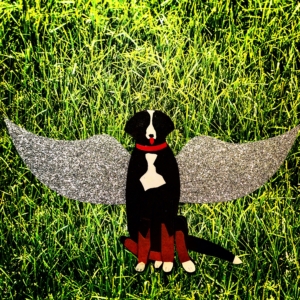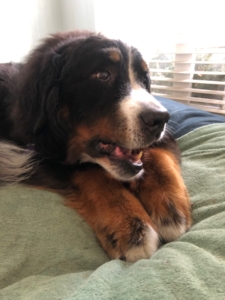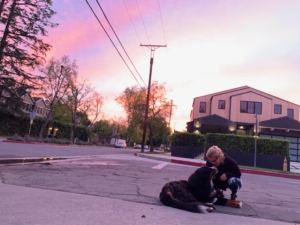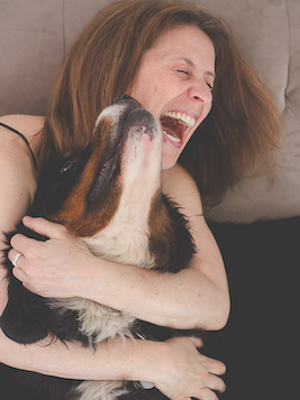Permutations of Love: Part II

Lester, April 6, 2020.
In 2006, the fabulously funny and wise Calvin Trillin published in The New Yorker a piece called “Alice, Off the Page.” This piece was actually the book that we now know as About Alice, a eulogy for Trillin’s beloved, remarkable wife. Though Alice succumbed to cancer in New York City on 9/11, Trillin has spoken publicly about not wanting Alice’s death to be linked to that day. And I understand why—About Alice is a glorious, glowing eulogy, and Alice deserves to be remembered in her own right.
Experiencing personal tragedy against the backdrop of collective tragedy is disorienting. On April 6, I made the terrible decision to say goodbye to the magnificent Lester. In the midst of our global pandemic, I sense that my grief over my dog—and my guilt over my decision to end his life—seems trite and self-indulgent, even to some who understand who he was and what he meant to me. But regardless of this, I continue to mourn and wrestle with what I find to be a nearly incomprehensible question: how can the last act of love be a decree of death?
Many people who share their lives with animals will at some point have to make the decision to end the life of a being they love. If they are lucky, they will know when the time is right because the animal will tell them. That didn’t quite happen in my case. Lester, in his stoicism, remained fully committed to his job of looking after me, despite the fact that he was either in pain from his degenerative myelopathy, or fighting the sedation caused by his pain medications. He wanted me to fix his problem, but he was by no means done battling it. He still wanted to be here. He enjoyed food, marrow bones, and seeing friends of both the human and canine variety, even from six feet away. However, after a few nights of him needing help moving from one favorite sleeping spot to another and not finding comfort in any position, I made the decision. Or rather, my conscience made the decision, slowly, gradually, over the course of a Friday, Saturday, and Sunday night, reality chipping away at denial until Monday morning, against my will, I picked up the phone to text my vet. A conversation would have been impossible.

Lester chewing a marrow bone, April 4, 2020.
What a horrible, humbling power to have. To ask—pay—someone to end his life, and to watch it happen in a matter of seconds, after everything he did for me—it’s a burden. I wrestle with the sense that I betrayed him, no matter how many people tell me that I showed mercy in ending his suffering. Here, guilt and mercy are intertwined, inseparable. And I have regrets. Because of COVID-19, the vet, the vet tech, and I—all of us just inches apart from each other—wore masks that must have been a source of confusion and stress for Lester in his last minutes of life. We also wore latex gloves that probably overwhelmed his sense of smell and tugged at his fur as we tried to soothe and calm him. But my biggest regret has nothing to do with the virus and everything to do with me. I wasn’t entirely present for Lester as the vet was ending his life. I was there, physically—my hands were on him, I was speaking to him—but I couldn’t look him in the eye. I had come up against the limits of my strength and compassion. When he was dead, the vet said I could stay in the room with him as long as I wanted, but I left quickly, like a coward.
Articles have begun to surface in the news about how great the coronavirus is for Earth. Pollution of every kind is down, the air quality is the most breathable it’s been in recent history, seismic activity generated by people has decreased dramatically. The world has, quite literally, ceased to vibrate with our movement. In the past, when I needed to retreat for whatever reason, it’s been against the backdrop of the world continuing to spin, which caused anxiety about falling behind. But now, as I mourn, the world has stopped. There is no traffic, no human sound, no sense that daily life goes on. The downside: I am unable to do important things for my mental health. The upside: I grieve in true silence, stillness, and privacy. I sit in my house and feel both the presence and the absence of Lester without the sensation that I’m being left behind, or rather, being pulled forward and forced to leave him behind. I do not have to go outside where I will run into people who ask about him and either respond with such cluelessness that I resolve to strike them from my roster of people worth talking to, or such kindness that I cry in front of them.
For nearly ten years, I started each morning by singing nonsense songs to Lester in cartoon voices. A common theme of these songs was stinky-ness, though Lester rarely smelled bad or even dog-ish—I just like the word “stinky.” Occasionally, if I came up with a good song, I’d record it. The other night, I spent an hour collecting as many of the songs as I could find, searching my phone, the cloud, and my laptop. In the background of one, called “Stinky Chicken Stinker,” I discovered one of my favorite sounds—Lester drinking water in his usual thunderous triplet pattern (one, two, three, pause; one, two, three, pause…). In another, “Squishy, Squishy, Squishpot Bear,” I heard his funny yowling yawn. In yet another, called “Bone Crunching,” there was no song, just him, chewing on a hefty marrow bone with alarming force, cracking it into pieces. Lester was 95% sweetheart, so it was easy to forget how fierce he could be. Once, in the middle of the night, I woke to the sound of growling and leapt out of bed to find him facing the front door, inflated to the size of a grizzly bear, hackles up, lips pulled back to reveal his formidable teeth, primed and ready for whatever was about to happen. The person trying to break in wisely reconsidered and fled.

Lester at sunset, March 31, 2020. Photo by Mary Catherine Greenawalt.
Now, when I wake up in the morning, there is a mantra running through my head instead of a nonsense song in a cartoon voice. It’s not perfect—a meditation teacher would tell me it’s way too long—but it seems to be helping, and it’s all I have right now to beat back the guilt I imagine he wouldn’t want me to feel, especially in this bleak social isolation we’re all navigating as we worry about our health and the health of those we love. I did the right thing…I did the right thing…it was hard, and awful, and sad, and scary, but I did the right thing…I did the right thing…one, two, three, pause; one, two, three, pause…
Louise Rozett is the author of the Confessions series (Confessions of an Angry Girl, Confessions of an Almost-Girlfriend) published by HarlequinTEEN, and a pilot, based on the series, that won best half-hour original script at the Austin Film Festival. Her play Break, about the effects of the 9/11 recovery effort on the recovery workers and their families, was a finalist for the Stanley Drama Award, was workshopped at New York Stage & Film, and will be published by Broadway Play Publishing in April 2020. She is a graduate of Vassar College and the MFA acting program at The Theatre School at DePaul University. Visit Louiserozett.com for more.
Photo credit: Ericka Kreutz Photography





